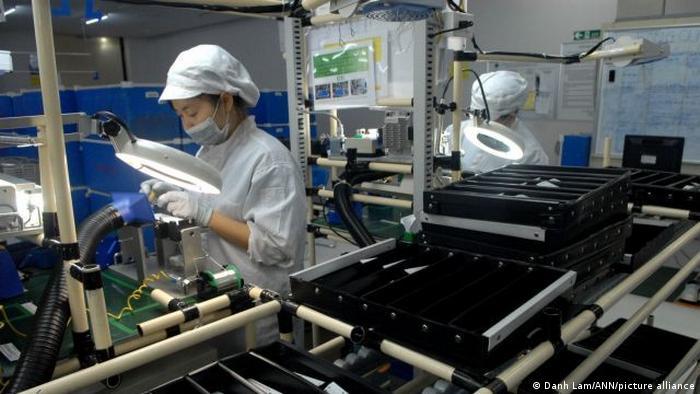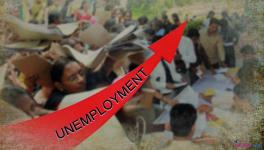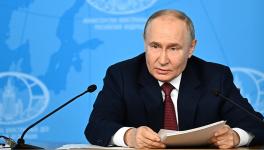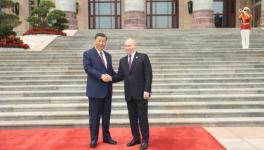EU Recession Fears Spark Concern in Southeast Asia

ASEAN countries exported goods worth around €136 billion ($136.8 billion) to the EU in 2021
It's becoming increasingly obvious to most economists that the European Union will face a brutal winter of discontent. Inflation is surging across much of the region. An energy crisis, accelerated by the Ukraine war, has already pushed household and business bills to the hilt, and things are expected to get much worse later in the year.
A cost-of-living crisis is likely to dent consumption. Most forecasters are expecting Europe's economy to contract this year.
The bank JPMorgan Chase expects the eurozone economy to contract 2% during the fourth quarter.
"A recession is coming," The Economist magazine put it in an article last week.
Southeast Asian countries, most of which count the European Union as one of their four largest trading partners, are watching on with a mixture of trepidation and opportunity.
An EU recession would have the heaviest impact on Southeast Asia's merchandise exports, tourism and investment sectors, said Tamara Henderson, Bloomberg Economics' economist for the Association of Southeast Asian Nations (ASEAN) region.
"All of these are likely to be weaker for Southeast Asia in the second half of 2022," she said.
Henderson said she expected to see slower year-on-year growth in these areas, but not "outright contractions, in part because of the low base effect from the pandemic."
EU a major trade partner for ASEAN
ASEAN countries exported goods worth around €136 billion to the European Union in 2021, up from €120 billion a year earlier, according to EU data. The EU states accounted for around 15% of all inward investment in the region last year, according to ASEAN statistics.
European tourists accounted for just 5% of all visitors to the ASEAN bloc in 2019, before the pandemic. But they tend to be bigger spenders than tourists from other Southeast Asian countries or from China, who make up the bulk of the tourist trade in the region, analysts say.
More than ever, as the tourism-reliant countries in the region are trying to get this sector back up and running, European tourists this winter would be essential.
As early as March, Malaysia's Maybank warned in a report that a spillover of the Ukraine war leading to a Europe-wide recession would have "collateral damage on ASEAN."
The IMF has already cut its global 2022 GDP growth projections from 3.6% to 3.2%, and 2.9% for 2023. In July, the Asian Development Bank (ADB) revised its forecasts for developing Asia, which includes much of Southeast Asia, down from 5.2% to 4.6% for 2022, and from 5.3% to 5.2% for 2023.
James Villafuerte, a senior economist at the ADB, points out that the impact would vary significantly by country. The EU purchased a fifth of Cambodia's exports last year but only 9% of Indonesia's exports, according to EU data.
The EU accounted for about 11% of Vietnam's exports and around 10% of Malaysia's. Vietnamese exports to the EU surged by nearly 45% in the first half of this year, compared with the same period in 2021, according to Vietnamese government data.
'A negligible hit'
Analysts who spoke to DW say an EU recession wouldn't leave Southeast Asian economies on the ropes but it would certainly dent key industries, especially as they are currently on an upward curve of growth following the pandemic.
The situation would be much more dire if an EU recession were coupled with a similar downturn in the United States later this year — which remains a possibility — and a continuing slump in China, especially if its "zero-COVID" policy isn't lifted after the upcoming quinquennial congress of the Chinese Communist Party in mid-October.
"A recession in the EU certainly would harm ASEAN exports to the bloc, but there's a good chance that this hit will be negligible in terms of overall export growth," said Miguel Chanco, chief Emerging Asia economist at Pantheon Macroeconomics, a UK-based consultancy.
Analysts point out that an EU recession wouldn't have too much of an impact on certain features of regional economics. Southeast Asian countries are not reliant on imports from the continent, which were worth just €80 billion for the entire ASEAN region last year, less than a fifth of its imports from China.
"The worst of China's slowdown is also behind it," Chanco said, adding that increased trade with the Asian giant could somewhat compensate for any downturn of trade with the European Union.
An opportunity for Southeast Asia?
On top of that, Southeast Asia is experiencing a boom in domestic demand as their economies fully reopen from the pandemic, Henderson said. "That means growth in most of Southeast Asia should be stronger in 2022 compared to last year," she suggested.
"Southeast Asian countries have worked — and are continuing to work — to develop a more diversified export base," Henderson said. "The region has also been slowly, but steadily, implementing reforms to permit closer economic integration within ASEAN to help insulate against external shocks."
"As it stands, trade flows within SE Asia already rival those with China," Henderson said. "In some cases, such as Indonesia and the Philippines, net exports are a relatively small share of the overall economy."
On the other hand, some Southeast Asian countries could even benefit from the European Union's challenges, Chanco said. As the world's largest exporter of palm oil, Indonesia's energy exports will be in high demand this coming winter, assuming there remains no resolution to the war between Ukraine and Russia.
It is also a major exporter of coal, although, for the second time this year, Jakarta has banned the export of coal to protect domestic supplies. That could change later in the year, especially after the EU last month imposed an outright ban on Russian coal imports.
Filippo Bortoletti, country director for Vietnam at Dezan Shira & Associates, a business advisory firm, noted that an EU recession might even see more businesses from the bloc consider investing in and relocating to Southeast Asia. "European brands could find new life and growth opportunities by investing in one of the fastest growing markets ... in the world," he said.
Edited by: Srinivas Mazumdar
Get the latest reports & analysis with people's perspective on Protests, movements & deep analytical videos, discussions of the current affairs in your Telegram app. Subscribe to NewsClick's Telegram channel & get Real-Time updates on stories, as they get published on our website.
























